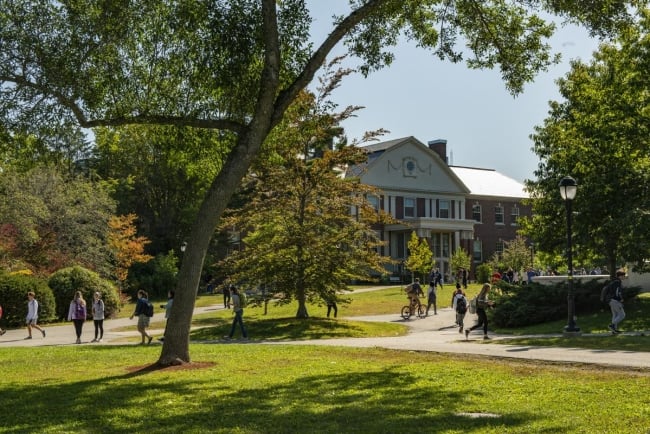You have /5 articles left.
Sign up for a free account or log in.

University of Maine
When the University of Maine College Republicans asked Amy Fried to be their faculty adviser, the group knew Fried was a Democrat who writes a progressive column in the Bangor Daily News.
Fried, the university's political science department chair, became the adviser for the UMaine College Democrats and the libertarian Young Americans for Liberty, or YAL, chapter at the university in October 2019. UMaine's College Republicans asked for her oversight shortly thereafter, when their previous adviser moved to another state. She agreed, but didn't last long. Fried resigned after a month, saying she wanted to disassociate with UMaine College Republicans’ hardline anti-immigration stance and use of social media to "get a rise out of people."
The group invited Michelle Malkin, a conservative columnist who was cut off from speaking at future Young Americans for Freedom events in November 2019, after she praised Nick Fuentes, a broadcaster who has been criticized for anti-Semitic remarks, Holocaust denial and interrupting speakers, The Hill reported. Fried takes issue with the way Fuentes and Malkin speak about immigration policy, and drew the line when student members of UMaine College Republicans appeared to show support for them, she said.
“There’s a difference between disagreeing on immigration policy and talking about immigration in these ways that are very negative, denigrating, demeaning and inaccurate,” Fried said. “At the same time [UMaine College Republicans] have every right to have their views and express their views … They have every right to exist and the best answer is for people to engage with them and express their own views, but I also have my own freedom of association.”
It was an “overwhelming support for free speech and free expression” that led Fried to agree to be listed as the group’s adviser, she said. Fried had overseen the same chapter from 2015 to 2018. But UMaine College Republicans have adopted a different set of politics since then. Fried described the group as "very Trumpy to alt-right."
Jeremiah Childs, the group's vice president, said they identify with President Donald Trump’s “America First” movement and are more socially conservative than the previous iteration of UMaine College Republicans.
“It’s really fallacious linking us to Holocaust denial,” Childs said. “The whole thing is very hyperbolic. We believe the Holocaust happened … I would not say that [Fuentes] represents us whatsoever. Our goal is to promote conservatism, the agenda, this is what we do. He is one person and is not representative of us. They’re doing this to delegitimize us because we’re popular.”
Some former members left the group to join other conservative organizations on campus, such as YAL. Some are considering forming a new College Republicans chapter, Fried said. About six members left last year. Childs said some joined Maine's chapter of Turning Point USA, another conservative campus group.
UMaine College Republicans take conservative stances on immigration, homosexuality and gender relations, and climate change. The group’s Facebook page had about 400,000 views in December, Childs said. In October, UMaine College Republicans published to Facebook a controversial post calling indigenous South American people “brutal societies … corrupted by rampant ritual sacrifice and cannibalism” in protest to the state’s renaming of Columbus Day to Indigenous Peoples Day.
The post drew a response from administrators, who in a universitywide message said that the post uses 15th-century Spanish propaganda and dehumanizes indigenous people, some of whom have close ties with Maine, said John Bear Mitchell, coordinator of the university’s Native American waiver and educational program. Mitchell is a citizen of the Penobscot Nation, which is located nearly six miles from Maine’s Orono campus in Indian Island, Me.
“We fully understand that this sort of material is upsetting to many members of our community, and it does not align with our values or the stated values of the university,” the university’s message said. “UMaine is a community brought together in our differences, and some of our most highly held values are civility, inclusion, compassion, understanding and respect. When those values are called into question by the words or actions of others, the reverberations are real and widely felt.”
Mitchell questioned Maine’s decision to note UMaine College Republicans’ right to free speech in the university’s initial statement on the offensive Facebook post, which suggested “the best remedy for speech we do not like or disagree with is more speech.” But in addressing the post head-on and engaging in discussion with concerned students and the Native American community, Mitchell said the university helped make their voices heard.
“Racism and racial awareness is really out there, it’s really visible now,” Mitchell said. “Because it’s so visible and we see it happening, people feel visible.”
Fraught Relations With College Democrats
An indigenous student organized a protest of about 100 people on campus in response to the Facebook post. Members of UMaine College Republicans attended to disrupt it, Mitchell said. Later, members harassed and physically threatened the student organizer, and out of fear she did not attend classes for a week, Mitchell said. Margaret Nagle, senior director of public relations, said Maine does not comment on matters of student conduct when asked about the accusation of harassment. The group denied those allegations.
“This is not true at all, we’ve never harassed anybody,” Childs said. “Nobody in our group has ever been found guilty of anything … My members always treat everyone with dignity and respect.”
Fried, who has taught at the university since 1997, said the discourse between college Democratic and Republican groups has gone downhill since her oversight of the group from 2015 to 2018, when leaders were friendly with each other and participated in constructive debate.
The Democratic group’s debates and conversations with UMaine College Republicans have been fraught, said Liam Kent, president of UMaine College Democrats.
“We have conversations but they’re not productive … they’re faux conversations to pass the time,” Kent said. “We try to be nice to them, we try to be cooperative with them and we try to keep it amicable between the groups, but they have stepped way over the line many times.”
Kent, who is gay, said his members do not feel safe in the same room as members of UMaine College Republicans and “fear that they will face repercussions for being who they are” when engaging with the group’s members. The only forum UMaine College Democrats will engage in is a formal debate, because those events are a “somewhat safe zone” with university security personnel, he said.
Because Fried resigned, the chapter of UMaine College Republicans is considered inactive by the university’s student government. It will need to reapply for recognition and be approved by a committee of student organizations and the Student Senate, Nagle said. Childs said the group has multiple candidates interested in becoming its faculty adviser.
UMaine College Republicans remains recognized by the College Republican National Committee, or CRNC, under the Maine Federation of College Republicans, said Childs, who is the federation's vice chairman. The CRNC did not respond to multiple requests for comment. Nagle said Maine had not spoken to the CRNC about the chapter’s behavior.
While the group is no longer recognized by the university, they can easily reorganize once they meet the student government requirements, Mitchell said.
“Any group that partakes in any racism or hate or direct threats to any students should be easily removed. But they’re not -- they’re protected,” he said. “I wouldn’t say that we should eliminate any Republican club. But anybody who engages in hate and racism should be removed, without question.”




